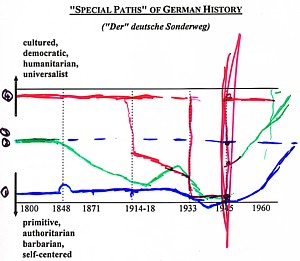|
"The"
Sonderweg: Germany's four special paths to modern statehood
(back to top)
Guiding question: How
do different views about unique features of Germany's history prior to
1945 affect what happens after 1945?
- Fulbrook's textbook, pages 2-5, gives a capsule summary of various
possible special paths, "turning points where Germany failed to
turn."
- For the sake of simplicity, I'll outline 4 different "special
paths" (they overlap and have variations):
- Ideological-Cultural (long-term--since Luther,
ca. 1500): traditions of obedience, militarism, bureaucracy, antisemitism
|
Ditty
in satirical magazine Punch, 1913
illustrates special path 2:
Once the land
of poets, seekers, sages
Who enchant us with their deathless pages
Now the Prussian Junker, blind with fury
Claims to be God's counsel, judge and jury |
- Political (middle-term--during 1800s): Germany's
unification "from above" by elites, instead of "from
below" by economic middle class (bourgeoisie) during industrialization,
- Economic (middle-term--early 20th century): unique
circumstances after World War I
- Accidental (also ideological-cultural, but very
short term): "Factory accident," (in German: Betriebsunfall):
German historians after 1945 postulated that Germany actually had
especially good traditions (a superior special path) until things
just "broke down" for the 12 years under Hitler.
- Link: see Prof. Raffael
Scheck's Germany and Europe lecture notes on the Sonderweg
(see especially the summary of positions in his 4 bullet points [2013 Internet Archive version])
|
